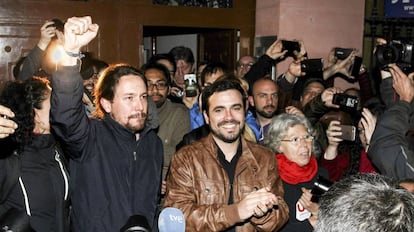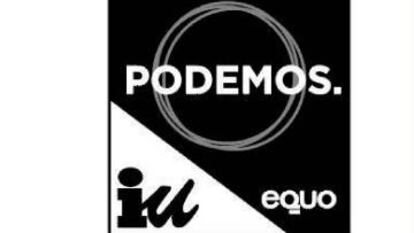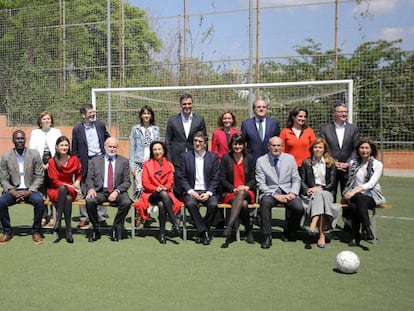United Left-Podemos coalition takes second place from Socialists: poll
The new alliance between the left-leaning parties has carved out a three-point lead over the PSOE, according to the latest Metroscopia survey


The new alliance between Podemos and United Left (IU) ahead of the June 26 elections has taken second place in voting intention in Spain, a new poll shows.
The recent agreement with the Communist Party-led IU appears to have benefited the anti-austerity group after weeks of dwindling ratings caused by the prolonged gridlock in Spanish politics following the inconclusive December 20 elections.
A new Metroscopia survey for EL PAÍS shows that the new leftist alliance would push the Socialist Party (PSOE) down to third place, while the conservative Popular Party (PP) would renew its December 20 victory, possibly with an even greater lead over its rivals.

With a month to go before the polls, the sum of forces led by Pablo Iglesias and Alberto Garzón has a three-point advantage over the Socialists, the poll shows. Voting intention for Unidos Podemos, as the alliance has been branded, is 23.3%.
However, the unpredictability of Spanish electoral legislation, which is skewed in favor of the majority parties, could still mean that Unidos Podemos ends up with fewer seats than the Socialists, despite earning more votes.
The polling firm made its calculations on the expectation that voter turnout will be particularly low: 68%, five points down from December 20 and six points under the historical average since Spain embraced democracy in the late 1970s.
Lower turnout
This low turnout benefits the PP, which has a larger pool of loyal voters than other parties. The Metroscopia survey suggests that acting prime minister Mariano Rajoy would attract 29.9% of the votes, a 1.2 point improvement over his December results.
Sign up to our newsletter
EL PAÍS English Edition has launched a weekly newsletter. Sign up today to receive a selection of our best stories in your inbox every Saturday morning. For full details about how to subscribe, click here.
Rajoy has been running a passive campaign based on the notion that Spain is witnessing a battle between “good sense and moderation” on one side and “left-wing extremism” on the other.
Since winning the December election by too small a margin for an overall majority, he has refused to consider any governing deal other than a grand coalition with the Socialists, who have so far rejected his offer.
Meanwhile, Socialist leader Pedro Sánchez has an uphill struggle ahead of him as he sees his party drop 1.8 percentage points in voting intention. Spain’s other emerging party, Ciudadanos, is backed by 15.5% of voters, a 1.6% rise from its December results.
English version by Susana Urra.
Tu suscripción se está usando en otro dispositivo
¿Quieres añadir otro usuario a tu suscripción?
Si continúas leyendo en este dispositivo, no se podrá leer en el otro.
FlechaTu suscripción se está usando en otro dispositivo y solo puedes acceder a EL PAÍS desde un dispositivo a la vez.
Si quieres compartir tu cuenta, cambia tu suscripción a la modalidad Premium, así podrás añadir otro usuario. Cada uno accederá con su propia cuenta de email, lo que os permitirá personalizar vuestra experiencia en EL PAÍS.
En el caso de no saber quién está usando tu cuenta, te recomendamos cambiar tu contraseña aquí.
Si decides continuar compartiendo tu cuenta, este mensaje se mostrará en tu dispositivo y en el de la otra persona que está usando tu cuenta de forma indefinida, afectando a tu experiencia de lectura. Puedes consultar aquí los términos y condiciones de la suscripción digital.










































